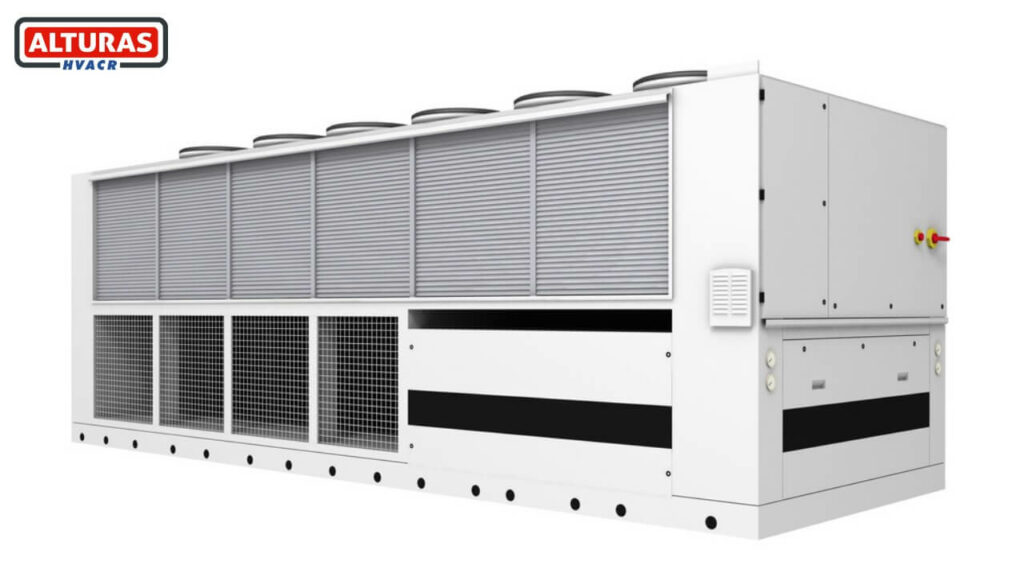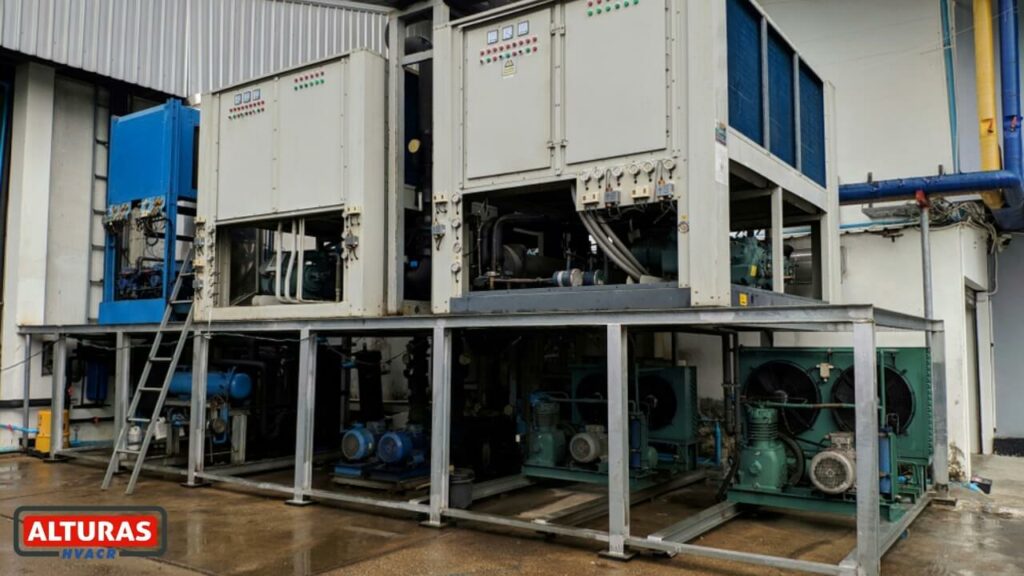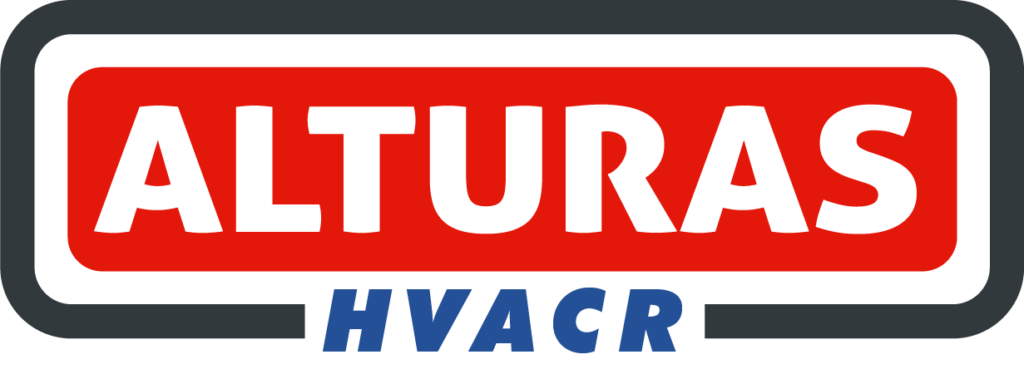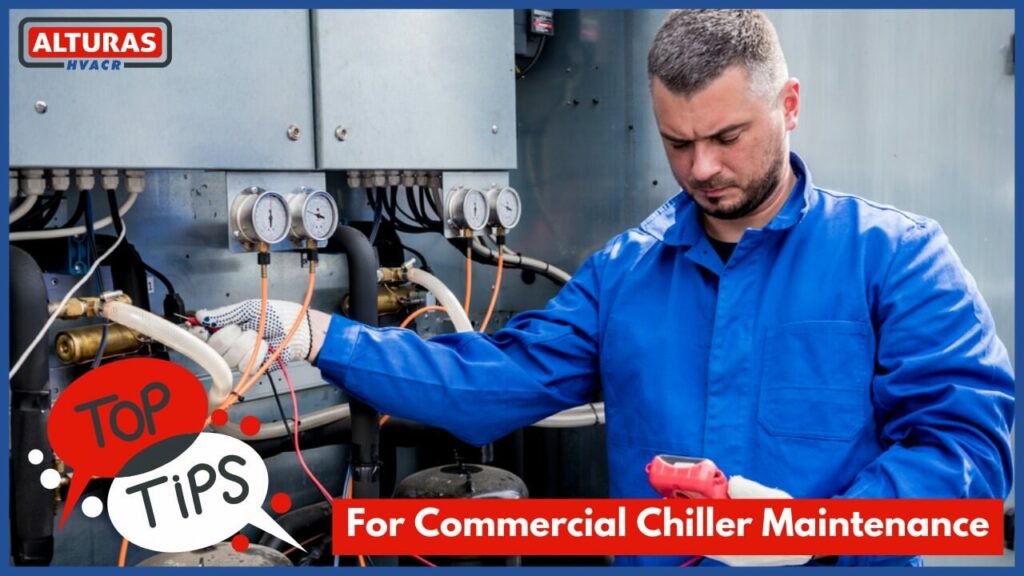Commercial chillers are essential components of many industrial and commercial settings, providing cooling for a wide range of applications. They are installed in commercial buildings to achieve proper temperature control. There are two types: water-cooled chillers and air-cooled chillers. Both are used to cool fluids or dehumidify air in both commercial and industrial facilities.
Like any other commercial HVAC equipment, regular commercial chiller maintenance is required to ensure optimal performance, energy efficiency, and reliability. Proper maintenance not only helps prevent breakdowns but also extends the lifespan of the chiller. Moreover, it reduces the need for costly repairs or replacements.
What is a Commercial Chiller?
A commercial chiller is a refrigeration system designed to cool large spaces or equipment in commercial settings, such as malls, hotels, or industrial facilities. It removes heat from the air or water, maintaining optimal temperatures for various applications, ensuring efficient and reliable climate control in commercial environments.
Tips for Commercial Chiller Maintenance
Following are the Top ten tips for Commercial Chiller Maintenance.
Inspect the Water Flow regularly
Commercial chillers rely on a steady flow of water to operate effectively. Therefore, it is important to regularly inspect the water flow. Check for any blockages or leaks that could cause the chiller to malfunction. Clogged pipes, dirty filters, or malfunctioning valves can all cause water flow issues. This in turn can reduce the chiller’s performance and increase its energy consumption.
Clean the condenser coils of the Commercial Chiller
The condenser coils in a chiller can easily become clogged with dirt and debris. The buildup of minerals, scale, dirt, and algae can degrade heat transfer in the system’s tubes. Resultantly, it reduces the chiller’s efficiency and performance. Hence, regularly cleaning the condenser coils is an essential part of chiller maintenance.
Clean coils at least annually or when required by your normal chiller maintenance schedule. It allows the chiller to operate at peak performance and helps prevent future breakdowns.
Related: How to Clean your HVAC Coil
Adjust the chilled water flow rate

Adjust the chilled water flow rate by keeping the incoming water flow rates at 3 to 12 feet per second. A flow rate that’s too low reduces equipment efficiency, while a flow rate that’s too high produces damaging effects such as vibration and increased amounts of noise.
Add water-treatment chemicals to condenser water
Commercial chillers rely on clean water to operate effectively. Therefore, a water treatment system is essential for keeping the water clean and free from harmful contaminants. Carrying out proper water treatment from time to time will help prevent corrosion, scale buildup, and biological growth, algae growth in the condenser. Check chilled water loops and piping at least annually for signs of these problems. In case you find any of these issues, increase water treatment and overall chiller maintenance.
Monitor the Refrigerant Levels of Commercial Chiller
Refrigerant is the substance responsible for heat transfer and heat release within the chiller. Therefore, the chiller requires a specified amount of refrigerant to operate properly and prevent damage to the compressor. Refrigerant levels should be checked regularly. Low refrigerant levels can cause a wide range of issues for commercial chillers, including reduced cooling capacity, increased energy consumption, and eventual damage to the compressor.
On the other hand, if the level is low, check for leaks or issues that could be causing the equipment to lose refrigerant. Regularly monitoring the refrigerant levels can help prevent these issues, ensuring that the chiller runs smoothly and efficiently.
Maintain the Evaporator Tubes
The evaporator tubes in a chiller are essential components that help cool the water passing through the chiller. Over time, these tubes can become fouled with dirt and debris thus reducing the chiller’s efficiency and performance. Regularly cleaning and maintaining the evaporator tubes is an important part of chiller maintenance. This ensures that the chiller operates at peak performance and energy efficiency.
Keep the Electrical Components in Good Condition
Commercial chillers rely on a range of electrical components to operate. This includes motors, sensors, and control panels. Regularly inspecting and maintaining these components is an essential part of chiller maintenance. This ensures that the chiller operates safely and efficiently.
Have compressor oil analyzed regularly
The condition of compressor oil can reveal issues with the compressor. At least once a year, send a sample of compressor oil to a qualified laboratory for spectrometric analysis. As a result, this chemical analysis will reveal problems in the compressor oil such as the presence of excess moisture that could interfere with chiller performance.
Check the Belts and Pulleys

The belts and pulleys in a chiller are essential components that help ensure proper mechanical operation. Over time, these components can become loose, causing issues with the chiller’s performance and efficiency. Therefore, regularly checking and adjusting the belts and pulleys is an important part of chiller maintenance. This ensures that the chiller runs smoothly and efficiently.
Perform Regular Inspections
Regular inspections by professional HVAC contractors are an important part of chiller maintenance. This helps to identify potential issues before they cause the commercial chiller to completely malfunction. Furthermore, it is important to check for signs of wear and tear, such as rust or corrosion, and to check for any leaks or other issues that could impact the chiller’s performance.
Schedule Professional Commercial Chiller Maintenance
While many aspects of commercial chiller maintenance can be performed in-house by following the above chiller maintenance checklist. Still, it is also important to schedule regular professional chiller maintenance. Professional maintenance services can help identify potential issues before your HVAC equipment collapses. Contact Alturas commercial HVAC contractors in Los Angeles. Our expert HVAC technicians provide commercial chiller maintenance services 24/7.
Common FAQs About Commercial Chiller
What Does a Commercial Chiller Do?
A commercial chiller is a refrigeration system that removes heat from a space or equipment, maintaining desired temperatures. It circulates a refrigerant through coils, absorbing heat and dissipating it elsewhere, ensuring efficient cooling for large commercial spaces, industrial processes, or equipment.
How Does a Commercial Chiller Work?
A commercial chiller works by circulating a refrigerant through a closed-loop system. The refrigerant absorbs heat from the air or water in the process, and then, through compression and expansion cycles, releases that heat outside, enabling effective cooling for commercial spaces or equipment.

